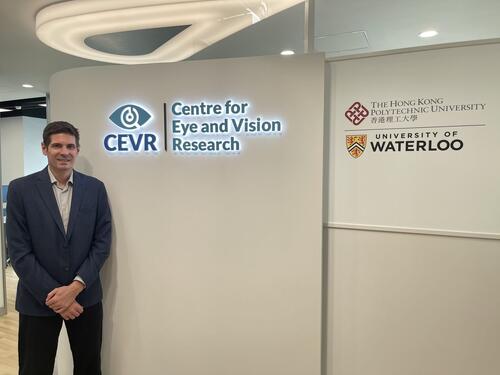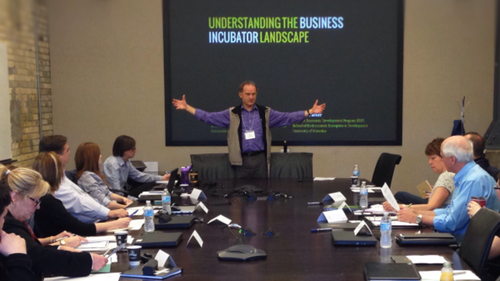The Daily Bulletin is published by Internal and Leadership Communications, part of University Communications
Contact us at bulletin@uwaterloo.ca
Submission guidelines
Editor:
Brandon Sweet
University Communications
bulletin@uwaterloo.ca

A University of Waterloo professor has been named a winner of New Zealand’s Te Pūiaki Putaiao Matua a Te Pirimia Science Prize, the country’s top award for scientific discoveries that have had a significant economic, health, social and/or environmental impact around the world.
Ben Thompson, a professor in the School of Optometry & Vision Science and 2022 University Research Chair, is part of the award-winning inter-disciplinary neonatal glucose studies research team out of the University of Auckland’s Liggins Institute. Over the past 20 years, this team’s research has been central in developing new ways to diagnose, treat and prevent blood sugar imbalance in babies. Their research into neonatal hypoglycemia has changed practice around the world, saving millions of health-care dollars and improving the lives of mothers and babies worldwide.
Key discoveries have included the use of dextrose (sugar) gel immediately after birth, which is now recommended internationally as a first-line treatment for low blood sugar. Other significant contributions have included the development of Gluco-Light, a non-invasive glucose monitoring device that reduces the need for repeated heel-prick tests and a new evidence-based method for testing vision in young children with hypoglycemia.
Professor Thompson said their research team was inspired to do this research because the problem of understanding and treating blood sugar in babies has been around for decades. “Almost a third of all babies are born at risk of having low blood sugar. It is a very common problem that, without a solution, could lead to irreversible brain injury and other complications later in life.”
Tackling such a broad range of questions over the past 20 years of study – including what low blood sugar does to a child’s vision and an understanding of what they see – has required a broad range of skills in the team, says Thompson.
“Our research team has needed specialties like bioengineering, psychology, education and more in order to be successful,” Thompson said. “It’s been really rewarding to be able to offer my background in vision science to the overall expertise of such a talented team.”
Presented by New Zealand’s Prime Minister Jacinda Ardern during the May 31st ceremony, the team will receive a $500,000 prize that will allow researchers to keep progressing in their work, including their ongoing work to develop a national guideline in New Zealand to support the management of babies at risk of hypoglycemia.

By Naomi, a Waterloo student. This is an excerpt of material from the undergraduate "missing manual."
Whether you’re in the process of coming out, proudly queer, or confused and questioning, I can tell you one thing for sure – you’re not alone.
University is commonly labelled as the time to figure your life out and find yourself. While these are inspirational and motivating phrases, they can also bring a lot of pressure. Figuring out who you are can be a terrifying and difficult experience, especially if you feel alone. When I started questioning my sexuality, it was a scary, isolating process. After I came out, I realized being queer didn’t have to be a form of solitude, rather it was a new opportunity to become part of an amazing community. This desire for a sense of community sent me on the hunt, looking for clubs around campus to join that provided a safe space for me to feel comfortable in. I’m glad to say I found more than a few. Whether you’re in the process of coming out, proudly queer, or confused and questioning, I can tell you one thing for sure – you’re not alone.
The Glow Centre for Sexual and Gender Diversity is the first service I stumbled upon, and it also happens to be the oldest continuously-running queer and trans student organization in all of Canada. Glow advocates for a healthy attitude towards all sexual orientations and gender identities, promoting an inclusive and accepting environment. Located on campus in the Student Life Centre and constantly active on their Instagram, they lead advocacy projects, provide confidential peer support, host events and meetings, and even have their own collection of resourceful books and movies that students can check out.
We all need someone to talk to, and sometimes friends or family might not be an option – and that’s completely okay. Glow provides a strong support network for all 2SLGBTQ+ students, with appointment times for peer support available every week, which can be booked through their website. The nice thing about Glow is that it’s completely run by student volunteers, so everyone there wants to be there, and wants to give their support. Midas Beglari, a service coordinator for Glow says that "volunteering with Glow has been one of the most educational and formative experiences in my life. I know it can be overwhelming to put yourself out there and come to Glow, and we are here to support you in any way that you're comfortable with". Through active and confidential listening, Glow members help to provide a safe space for students to be heard and understood. If you’re looking for ways to get involved, Glow also hires new volunteers every term, so you can be part of an inclusive environment, and help provide one for others as well.
The Women’s Centre at Waterloo is another group run by dedicated student volunteers, committed to creating a safe and supportive atmosphere for women and transgender individuals across campus. Through their Facebook and Instagram, you can stay updated on information about guest lectures, workshops, film screenings and resources on women's and trans* folks’ health and sexual violence, all of which work towards making the Centre a positive and connective space for everyone. They also have an annual zine, Voices, which gives people who are commonly underrepresented in media a chance to share their thoughts and speak from their hearts. On this platform, different artistic expressions and experiences are recognized and published; artwork, stories, poems, you name it.
Promoting inclusivity and providing a safe environment is a campus-wide responsibility, which is why Waterloo’s Equity Office exists, along with many other resources across campus. The Equity Office strives to create a sense of belonging for all, removing systemic barriers against marginalized groups, and striving for an equitable and accepting atmosphere. They supply students, faculty, and staff from underrepresented groups with guidance and advice on equity issues, while building campus awareness on these matters. As a member of more than one marginalized group, it was comforting to see that there’s a place that recognizes the experiences faced by people with diverse identities.
Not only are the experiences of marginalized groups recognized, but they’re acted on too, as seen by the various opportunities offered to all campus members to get involved and educate themselves. Waterloo’s Equity Office provides different training opportunities, workshops, and initiatives to help everyone develop a deeper understanding of 2SLGBTQ+ identities. People can learn about their rights, become an ally, and help continue to shape Waterloo into the welcoming and united school that it’s become.
An annual event that I look forward to from the Equity Office is Pride at Waterloo, which is packed with panels and workshops throughout the month of June. Despite Pride month being once a year, the Pride at Waterloo web page is always available and is filled with lots of resources dedicated towards creating a more inclusive atmosphere. These resources range from articles about 2SLGBTQ+ challenges, informative videos on understanding and respecting identities, and interviews from queer and trans folks and advocates. Plus, there are clubs like EngiQueers, QTPOC-KW, UW Drag Club and many more that strive to empower the 2SLGBTQ+ community at Waterloo.
Read the rest of the article on the Missing Manual website

By Jon Parsons. This article was originally featured on Waterloo News.
The Natural Sciences and Engineering Research Council of Canada (NSERC) recently released a set of revised guidelines for what can be considered contributions to research.
Knowledge translation is now featured prominently on the list and includes “communication of research results and knowledge translation to specialist or non-specialist audiences, including the public.”
NSERC specifically acknowledges articles in news outlets and the popular press, media interviews, blog posts, social media publications and public lectures.
“It may take some time for these new guidelines to be widely-recognized,” says Anita Layton, professor of applied mathematics and Canada 150 Research Chair of Mathematical Medicine and Biology.
“In promotion and tenure, for example, some committees may not give it the credit it deserves. But with NSERC saying it matters and counts toward funding decisions, it’s only a matter of time until everyone gets the message.”
Layton has long been a trailblazer in science communication, something she says grew out of a necessity to effectively communicate with researchers in different fields and with the broader public audience she wants her interdisciplinary research to reach.
Researching in mathematical medicine means she needs to connect with specialists including medical doctors, clinicians, computer scientists and the front-line nurses caring for patients.
But her audience can also include non-specialists and the general public. For example, in Layton’s recent media release on how combining certain blood pressure and pain drugs can be a “triple whammy” that causes kidney damage, she wanted to directly reach the broad public audience who may benefit from the warning.
The release was widely syndicated in media outlets worldwide, and Layton even reports having heard from nurses and caregivers in the community who said the information reached their workplaces about the combination of drugs to look out for.
“One thing I found difficult with science communication at first was understanding my audience,” Layton continues. “Researchers can sometimes take for granted the specialist knowledge they have, so to do effective science communication we have to be able to step back and see it from another person’s point-of-view.”
Layton says researchers need to consider the audience when crafting any specific message they want to communicate and need to pick the right venue and the right medium. Besides publishing an article in an academic journal, researchers can write an op-ed or disseminate that message by posting or sharing a video on social media.
“Science communication can seem straightforward, but I’ve found there’s a steep learning curve. I tried to seek out excellent science communicators and learn from them,” she says.
Recently, Layton’s research lab has been creating a series of videos as a way to build upon the ongoing success of consistent media releases. She has also done radio interviews and podcasts.
Speaking of the recent foray into science communication videos, she says it has posed some new challenges “and it is certainly a lot of work.” But figuring out how to do science communication in this new medium is also pushing Layton to narrate the story of her research in creative ways and helping her reach new audiences.
“Every researcher I know wants to do meaningful work that matters to people,” she says. “But some of us may not know what is possible with science communication and what supports are available. I have found it helpful to start simple, maybe just with an op-ed, and get some feedback from some of the communications specialists we have on staff.”
“With the pace of change and the scale of the problems facing the world, effective knowledge translation is more important now than ever. As academics, we have a responsibility to put ourselves out there, even if it can be a little uncomfortable at first.”

By Jude Okonkwo. This article was originally published on Waterloo News.
The University of Waterloo and the Economic Developers Association of Canada (EDAC) are hosting their 50th anniversary banquet on June 2, 2022, to celebrate their partnership and accomplishments.
Since the launch of the partnership at Waterloo in 1972, it has provided learning opportunities for over 12,000 economic development professionals from over 500 communities across Canada.
With the increasing demand from professionals and the need to address the economic and sustainability challenges that Canadian communities are facing, the Economic Development Program (EDP) that was borne from the partnership has continued to expand and grow the range of topics being offered and has improved access to training for the growing audience.
“Both EDAC and Waterloo agree that we must ensure the program, first and foremost, is relevant, accessible to all, and provides a deep understanding of economic development processes with a uniquely Canadian focus,” said Penny Gardiner, chief executive officer, EDAC.
EDAC through the EDP partnership has been delivering on its mission to be the national source of professional standards, economic development knowledge and most effective method of exchanging ideas.
“For the past 50 years, the University of Waterloo has educated economic development professionals on the concepts and practices they need to successfully build their local economies,” said Aileen Murray, former president of EDAC. “EDAC is proud to celebrate these 50 years of partnership with the University of Waterloo and recognize the incredible contribution of the economic development program to our profession and, as a result, to the economic prosperity of the entire country.”
The partnership offers training, networking opportunities, professional development and an extensive list of resources that benefit economic developers and their municipal, provincial, federal, corporate, non-profit and Indigenous employers and contribute to Canada’s well-being.
In addition, the program has delivered training in every province and territory with programs tailored to local needs.
“We recognize that it is quite a feat for any organization to have such a long-standing partnership. However, when you have two parties that are committed in their direction and have a working relationship that is both respectful and friendly - it is a pleasure, not a task,” said Gardiner.
The program is successful due to many influential contributors. These include past and present directors of the program, David Walker (1972-1985), Chris Bryant (1985-1991), Jim Bater (1991-2008), and Paul Parker (2008-).
“The team that has made the program a nimble and evolving success over five decades includes 10 assistant directors, six staff members, 20 EDAC Course Committee Members, 30 instructors from Waterloo, as well as dozens of instructors from EDAC membership and the profession,” said Paul Parker, professor and director of EDP at Waterloo.
The celebration will feature a few speakers who have made the program an outstanding success over its 50 years and will be held at the Federation Hall, Waterloo.
The Writing and Communication Centre (WCC) reports that tomorrow is the deadline to apply to Dissertation Boot Camp. "Make progress and move forward on your thesis or dissertation at Dissertation Boot Camp," says a note from the WCC. Apply today.
Queen Elizabeth's Platinum Jubilee
Students can visit the Student Success Office online for supports including academic development, international student resources, immigration consulting, leadership development, exchange and study abroad, and opportunities to get involved.
Instructors looking for targeted support for developing online components for blended learning courses, transitioning remote to fully online courses, revising current online courses, and more please visit Agile Development | Centre for Extended Learning | University of Waterloo (uwaterloo.ca).
Instructors can visit the Keep Learning website to get support on adapting their teaching and learning plans for an online environment.
Course templates are available within your course in LEARN to help you build and edit your content and assignment pages quickly.
The following workshops, webinars, and events are offered by the KL team (CTE, CEL, ITMS, LIB):
Scholarship of Teaching and Learning (SoTL) Methods – self-directed, continuous self-enrollment course in LEARN.
Independent Blended Course Design (iBlend) - self-directed, continuous self-enrollment course in LEARN.
Copyright Overview for Waterloo Instructors and Staff - self-directed, continuous self-enrollment course in LEARN.
Independent Remote Course Design Essentials (iReCoDE) - self-directed, continuous self-enrollment course in LEARN.
Supporting Student Mental Health (for Instructors) – self-directed, continuous self-enrollment course in LEARN.
PebblePad Users Group (CTE7526), Thursday, June 2, 1:00 p.m. to 2:30 p.m.
SoTL Stories, June 15, 1:00 p.m. to 2:00 p.m.
Supports are available for employees returning to campus. Visit IST’s Hybrid Work and Technology guidelines and workplace protocols to assist with the transition.
The Writing and Communication Centre has virtual services and programs to help undergrads, grad students, postdocs and faculty members with academic writing.
Co-op students can get help finding a job and find supports to successfully work remotely, develop new skills, access wellness and career information, and contact a co-op or career advisor.
The Centre for Career Action (CCA) has services and programs to support undergrads, grad students, postdocs, alumni, and employees in figuring out what they value, what they’re good at, and how to access meaningful work, co-op, volunteer, or graduate/professional school opportunities. Questions about CCA's services? Live chat, call 519-888-4047, or stop by our front desk in the Tatham Centre 8:30 a.m. to 4:30 p.m., Monday to Friday.
Drop-in to Warrior Virtual Study Halls on Wednesdays from 5:30 p.m. to 7:00 p.m. Come together in this virtual space to set goals and work independently or in groups each week.
Renison's English Language Institute continues to offer virtual events and workshops to help students practice their English language skills.
If you feel overwhelmed or anxious and need to talk to somebody, please contact the University’s Campus Wellness services, either Health Services or Counselling Services. You can also contact the University's Centre for Mental Health Research and Treatment. Good2Talk is a post-secondary student helpline available to all students.
The Library is open with expanded hours for access to book stacks, drop-in individual study space, bookable group study rooms, drop-in access to computers and printers, book pick-up services and IST Help Desk support. Librarian consultations, Special Collections & Archives and the Geospatial Centre are available by appointment. Full details on current services and hours are available on the Library’s COVID-19 Update webpage.
The Faculty Association of the University of Waterloo (FAUW) continues to advocate for its members. Check out the FAUW blog for more information.
The University of Waterloo Staff Association (UWSA) continues to advocate for its members. Check out the UWSA blog for more information.
The Sexual Violence Prevention and Response Office (SVPRO) supports all members of the University of Waterloo campus community who have experienced, or been impacted, by sexual violence. This includes all students, staff, faculty and visitors on the main campus, the satellite campuses, and at the affiliated and federated Waterloo Institutes and Colleges. For support, email: svpro@uwaterloo.ca or visit the SVPRO website.
The Office of Indigenous Relations is a central hub that provides guidance, support, and resources to all Indigenous and non-Indigenous campus community members and oversees the University's Indigenization strategy.
The Waterloo Indigenous Student Centre, based at St. Paul’s University College, provides support and resources for Indigenous students, and educational outreach programs for the broader community, including lectures, and events.
WUSA supports for students:
Peer support - MATES, Glow Centre, RAISE, Women’s Centre - Visit https://wusa.ca/services/wusa-peer-support to book an appointment either in person or online for the Fall term.
Food Support Service food hampers are currently available from the Turnkey Desk 24/7 in the Student Life Centre. Drop off locations are also open again in SLC, DC, DP, SCH and all residences.
Co-op Connection all available online. Check https://wusa.ca for more details.
Centre for Academic Policy Support - CAPS is here to assist Waterloo undergraduates throughout their experience in navigating academic policy in the instances of filing petitions, grievances and appeals. Please contact them at caps@wusa.ca. More information is available.
WUSA Student Legal Protection Program - Seeking legal counsel can be intimidating, especially if it’s your first time facing a legal issue. The legal assistance helpline provides quick access to legal advice in any area of law, including criminal. Just call 1-833-202-4571.
Empower Me is a confidential mental health and wellness service that connects students with qualified counsellors 24/7. They can be reached at 1-833-628-5589.
GSA-UW supports for graduate students:
The Graduate Student Association (GSA-UW) supports students’ academic and social experience and promotes their well-being.
Advising and Support - The GSA advises graduate students experiencing challenges and can help with navigating university policies & filing a grievance, appeal, or petition.
Mental Health covered by the Health Plan - The GSA Health Plan now has an 80 per cent coverage rate (up to $800/year) for Mental Health Practitioners. Your plan includes coverage for psychologists, registered social workers, psychotherapists, and clinical counselors.
Dental Care - The GSA Dental Plan covers 60 to 70 per cent of your dental costs and by visiting dental professionals who are members of the Studentcare Networks, you can receive an additional 20 to 30 per cent coverage.
Student Legal Protection Program - Your GSA fees give you access to unlimited legal advice, accessible via a toll-free helpline: +1-833-202-4571. This advice covers topics including housing disputes, employment disputes, and disputes with an academic institution.
The Graduate House: Open Monday to Tuesday 11:30 a.m. to 7:00 p.m. and Wednesday to Friday 11:30 a.m. to 9:00 p.m. We’re open to all students, faculty, staff, and community members. The Graduate House is a community space run by the GSA-UW. We’re adding new items to the menu. Graduate students who paid their fees can get discounts and free coffee.
Warriors vs. Laurier Blood Donation Battle. Join our “Waterloo Warriors” team on the Blood.ca website or app. #ItsInYouToGive
Equity and inclusion in industry sponsored contract research and commercialization consultations for researchers, Monday, May 9 to Friday, June 3. Sign up for an interview timeslot.
National AccessAbility Week 2022, Sunday, May 29 to Saturday, June 4.
NEW - Pop-up vaccination clinic, Thursday, June 2, 9:30 a.m. to 11:30 a.m., Student Life Centre.
Interviewing for Insight, Thursday, June 2, 5:30 p.m.
Alumni Weekend, Saturday, June 4, 9:00 a.m. to 9:00 p.m.
Paint Brubacher House!, Brubacher House Artist-in-Residence Workshops with Yulia Balobanova, Saturday, June 4, 3:30 p.m., BRH (Brubacher House, North Campus).
TD Walter Bean Visiting Professorship: faculty & graduate student meetings, Monday, June 6 to Friday, June 10.
“Moving Forward by Slowing Down: Considering Diverse Perspectives on Drug Decriminalization and Legalization,” in person or online for the Waterloo community (online for the general public). Tuesday, June 7, 1:00 p.m. to 3:30 p.m. Keynote: Dr. João Goulão, Ministry of Health, Portugal. Followed by a panel moderated by Globe and Mail journalist André Picard.
Master of Taxation Virtual Information Session, Wednesday, June 8, 4:00 p.m.
CPI Talk: Digital Disinformation and Democracy, Wednesday, June 8, 6:30 p.m., Zoom.
Building Respectful Research Relationships with Indigenous Communities Webinar, Indigenous History Month 2022, Thursday, June 9, 12:00 p.m.
The Daily Bulletin is published by Internal and Leadership Communications, part of University Communications
Contact us at bulletin@uwaterloo.ca
Submission guidelines
The University of Waterloo acknowledges that much of our work takes place on the traditional territory of the Neutral, Anishinaabeg, and Haudenosaunee peoples. Our main campus is situated on the Haldimand Tract, the land granted to the Six Nations that includes six miles on each side of the Grand River. Our active work toward reconciliation takes place across our campuses through research, learning, teaching, and community building, and is co-ordinated within the Office of Indigenous Relations.